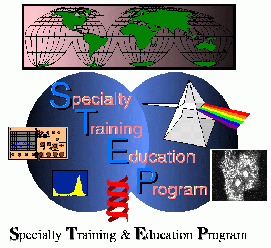 |
 |
 |
 |
 |

[Introduction to STEP]
[Table of Contents]
[STEP HomePage]
[Search for Keyword]
Immunobiology Department Naval Medical Research Institute 8901 Wisconsin Avenue Bethesda, MD 20889-5607
1. Facilities: The facilities are located in the Tissue Bank of the Naval Medical Research Institute. The spaces include an animal room for mice, and laboratories appropriate for isolation, preparation, and tissue culture of human blood and tissues. Special expertise in lymphocyte and bone marrow culture.
2. Instrumentation:
Flow cytometry: Epics Elite with an air-cooled argon ion laser, a helium-cadmium laser, and a He-Ne. Five-color calcium studies are done on this instrument. More colors are available if you can think of a meaningful experiment.
Ortho Cytofluorograf equipped with an air-cooled helium cadmium laser and an argon laser is available. This instrument has a closed quartz cuvette, and is used for calcium studies of potentially biohazardous cells. Four-color calcium studies can be done on this instrument. The flow cytometer data analysis system is IBM PC-based, and the software includes the Coulter Elite, as well as Phoenix Flow Systems for off-line analysis and for on-line acquisition data.
Fluorescence digital microscopy: A system for near real-time ratiometric measurement of calcium using fura-2 and other probes is available. The hardware consists of a Zeiss microscope equipped with two CCD amplified cameras, a Gould FD5000 image processor, and a DEC mVax host computer. Equipment for microinjection is available.
3. Specialization Areas: The laboratory conducts extensive investigations of lymphocyte calcium homeostasis in both mouse and human lymphocytes, as well as in other primitive bone marrow-derived cells. Studies are performed both by flow cytometry and by digital fluorescent microscopy. The laboratory has expertise in analysis of HIV-infected cells. The laboratory is located across the street from the NIH, providing convenient access for multidisciplinary studies.
4. Special Opportunities: Isolation, preparation, handling, activation, and analysis of human and mouse lymphocytes. Sorting on calcium responses is also done.
5. Special Courses Offered: None at this time.
6. Graduate Program: Not available at this time.
7. Local Accommodations:
8. Transportation: National Airport, Dulles Airport, and Baltimore-Washington Airport are 30 to 60 minutes away by ground transportation. The laboratory is most accessible from National Airport using the Metro system. Convenient rail access is available through Amtrak at the Union Station stop, which is also on the Metro Line.
9. Cost of Internship: Not available at this time.
10. Communication:
a) Studies on human cells C.H. June, M.D. Immunobiology Department Naval Medical Research Institute, Bldg. 1, Rm 163 8901 Wisconsin Avenue Bethesda, MD 20889-5607 Phone: (301) 295-5827 Fax: (301) 295-6857 E-mail: vjunr@helix.nih.gov
b) Studies on mouse cells R. Abe, M.D., Ph.D. Associate Professor of Medicine Uniformed Services University of the Health Sciences and Henry M. Jackson Foundation Naval Medical Research Institute, Bldg 1, Rm 147 8901 Wisconsin Ave, Bethesda, MD 20889-5607 Phone: (301) 295-1122 FAX: (301) 295-6857 E-mail: rinOrza@bumed30.med.navy.mil
 |
 |
 |
 |
 |
CD-ROM Vol 3 was produced by Monica M. Shively and other staff at the Purdue University Cytometry Laboratories and distributed free of charge as an educational service to the cytometry community. If you have any comments please direct them to Dr. J. Paul Robinson, Professor & Director, PUCL, Purdue University, West Lafayette, IN 47907. Phone:(765) 494-0757; FAX (765) 494-0517; Web http://www.cyto.purdue.edu, EMAIL cdrom3@flowcyt.cyto.purdue.edu